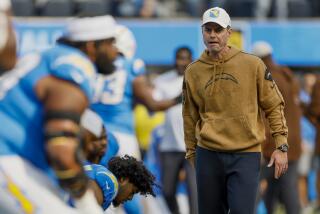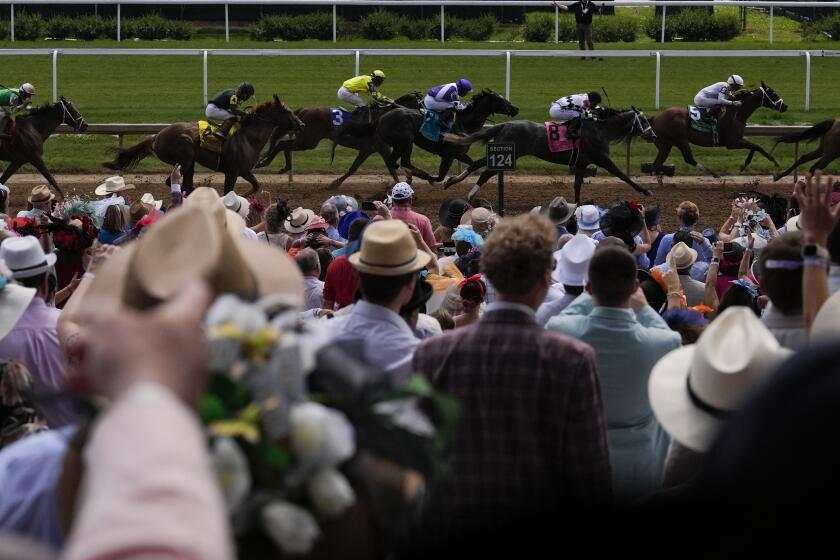Haku Lei, Hawaiian Gods Keep Stanley Dancing With Flag Stick
- Share via
Millie Stanley has duped them again. The Beep Beep girl from Escondido might look helpless against younger, stronger golfers, but the twinkle in her soft brown eyes reveals an impostor. In two shots, the Hawaiian gods will have her dancing cheek to cheek with the flag stick.
Where does pitch-and-putt Millie get the nerve to slay the big hitters? Surely the arthritic back and the aches and pains of being 61 are eroding her game. But Stanley is not concerned. With the help of yoga and tai-chi, she uses her mind now, not her body, to remain one of Southern California’s top amateur golfers.
“I have this awesome machine,” she says as she puts her fingers to her temples.
Every shot is a well-plotted mentally, every putt comes out of an imaginary portfolio that instantly turns to substance.
Throw in her lucky Haku lei that she wears on her hat, and a Hawaiian goddess as an extra caddy, and she feels unbeatable.
She enjoys the psych job her presence alone performs on younger opponents.
“They’ll say, ‘Who’s the old lady?’ Then they hear that I can get out of a garbage can.”
For days before the recent Mid-Winter at the Los Angeles Country Club--one of the year’s premier amateur tournaments--she played each hole over and over in her head. “No. 9, 162 yards, 3-iron,” she envisioned.
Although she qualified for the tournament’s championship flight, Stanley was beaten in the first round, 2-up, by Judy Hewson of Los Angeles, who is 20 years younger.
Sitting on a shady patio at the Wilshire Country Club, she tried to hide a hint of disappointment by saying she had played her best, but it was obvious that she couldn’t wait for the next tournament.
“I was either even or tied against Judy, but I was never ahead. You can’t make mistakes on a course like Los Angeles.
“If the course is under 6,000 yards, I get the feeling mentally that I can play awesome golf. I can win. I can reach 10 greens in regulation and par all the par-threes. The Hawaiian gods are always there.
“Los Angeles (Country Club) is a long one for me, but I can play Pebble Beach.”
On her longer iron shots she aims for the center of the green. On shorter irons, she goes on feel and hopes to be “dancing cheek to cheek (inside five feet) with the flag stick.”
From the tee, she tries to get all the distance she can by fading the ball (right to left).
“The other players call my ball the ‘beep, beep’ ball because when it hits the fairway, it skips forward like this, beep, beep,” she demonstrates by slapping her hand twice on the table.
Her goal this year is to win the USGA Seniors tournament at Modesto in October.
Stanley’s short game is her strength. Her precise putting and chipping were the avenues to victories in eight amateur tournaments last year, including the club championship at Wilshire, the San Diego Seniors championship, the San Diego County women’s championship, the women’s Southern California Golf Assn. tournament and the Women’s State Seniors championship at Monterey, for players 55 or older.
Stanley, who plays to a two handicap, also made the semifinals for the first time in the California State Amateur at Pebble Beach. She has incorporated tai-chi and yoga into her daily regimen. Both help her relax and ease the occasional back pain.
Last year in the Long Beach City Women’s Championship at Recreation Park, she had to quit on the 14th hole when a searing pain shot down her back and into her leg after she swung on her drive. It was the first time she had to pick up in her life.
“I sometimes do tai-chi when I’m playing,” she said. “but I do it so that the other players aren’t aware of it. I don’t want them to say, ‘What’s Millie doing.’ ”
Stanley was born on Oahu and began playing golf on her home island of Molokai when she was 4.
“My father (Joe Mahelona) would bring home wooden clubs that the rich Haoles (whites) had broken in frustration while they were playing.
“He’d fix them for us, and at night we’d sneak out on the course and play. We’d also dive for golf balls and sell them back for Simoi. It’s a Chinese name for dried plums.”
Stanley went to Japan in 1949 and worked as a civilian for the U.S. Navy in personnel. She heard that the U.S. service team needed a player, so she joined. The teams were all men.
“Don’t tell anybody this,” she said with a shy smile, “but the real reason I signed up wasn’t to play golf.”
She met her husband, Bob Stanley, in Japan. He was an enlisted man, and in 1955 they moved to Southern California, where she soon began her amateur career.
“That beautiful Haole is always backing me up. He caddied for me in the state tournament last year and not once did he get excited or try to encourage me or yell ‘Come on, Millie.’ He didn’t say one word.”
Stanley has no children of her own, but kids have come along anyway--18 nieces and nephews by her brother and his wife. “No twins,” Stanley said. “Sometimes I see them as extras on Hawaii Five-0.”
And in a way, the pros came, too. Stanley got the opportunity to play against future stars of the Ladies Professional Golf Assn. when she enrolled as a freshman at Cal State Long Beach in 1976 at the post-postgraduate age of 47.
Playing for the 49ers, she was pitted against such future professionals as Tulsa’s Nancy Lopez and San Jose State’s Patty Sheehan. She qualified for the NCAA tournament four consecutive times but never won.
Golf was secondary; education was low score on her card. Competing in the classroom sharpened her skills and gave her a mental discipline that carried over to the golf course.
She became a player/coach in her senior year and stayed on as the Long Beach head coach until 1984, when her husband, a banker with First Interstate Bank, retired and they moved to Escondido.
In 1967, Stanley won her first tournament, the L.A. City Championships.
An unknown from Griffith Park, a public course, Stanley was matched against country club players who did their best to make her feel out of place.
“It motivated me and pushed me harder because I wasn’t supposed to win the tournament,” she said.”
Today, she has put that uncomfortable experience behind her. “Now, we are all players,” she said proudly.
More to Read
Go beyond the scoreboard
Get the latest on L.A.'s teams in the daily Sports Report newsletter.
You may occasionally receive promotional content from the Los Angeles Times.










